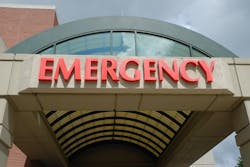The American College of Emergency Physicians is asking the Centers for Medicare & Medicaid Services to delay all regulatory requirements and deadlines for Medicare healthcare professionals, including the Merit-based Incentive Payment System (MIPS).
At a time when two emergency medicine doctors, in New Jersey and Washington State, are in critical condition as a result of coronavirus, ACEP is trying to make urgent priorities clear to the Trump Administration.
In A March 13 letter to HHS Secretary Alex Azar, ACEP President William P. Jaquis, M.D., noted that emergency physicians and other healthcare professionals are spending all their time and attention dealing with the COVID-19 crisis and do not have the capacity to meet the specific regulatory requirements, including their reporting obligations, under CMS’ quality performance programs.
Physicians currently have to submit their data for the calendar year 2019 performance period by March 31. CMS should extend this deadline and other similar regulatory deadlines by at least 30 days so that emergency physicians and other healthcare professionals can keep all their focus on treating patients, ACEP noted. This type of flexibility is consistent with the administrative relief the Office of Management and Budget (OMB) issued to recipients and applicants of federal financial assistance.
Besides the quality reporting challenges, the 38,000-member ACEP also identified several key gaps in care that need to be addressed to protect both patients and front-line healthcare workers in the challenging weeks that lie ahead. These major gaps include:
• Expanding the Number of Available Tests Across the Country;
• Coverage and Full Elimination of Cost-Sharing of Testing and Services Related to the Treatment of COVID-19;
• Coverage and Reimbursement of Emergency Telehealth Services;
• Appropriate Liability Protections for Front-line Health Care Workers;
• Clarification of the Centers for Disease Control and Prevention (CDC) Guidance on the Quarantining of Health Care Professionals Exposed to COVID-19;
• Guidance to Patients on When it is Appropriate to Come to the Emergency Department.
Here is some more detail from ACEP’s letter on some of those topics:
Full Coverage and Elimination of Cost-Sharing
ACEP said that while it appreciates that cost-sharing will be waived for COVID-19 tests, it remains unclear whether this extends beyond copayments to also include coinsurances and deductibles in covering all the diagnostic and treatment services for patients with suspected or confirmed cases of COVID-19. “It is more often coinsurances and deductibles that put a financial strain on patients rather than copayments, and therefore it is important for them to be included in this cost-sharing waiver. We urge the Administration to require all health plans to waive cost-sharing (including copayments, coinsurance, and deductibles) for all office, outpatient, and ED visits that result in an order for or administration of COVID-19 tests,” ACEP said. “To be clear, patients’ cost-sharing should be waived for all services in the visit, even if the COVID-19 test comes in negative. Insurers should not be allowed to retroactively deny claims or not cover cost-sharing if patients thought that they may have the disease but wound up not having it.”
Coverage and Reimbursement of Emergency Telehealth Services
ACEP strongly urged CMS and HHS to use their waiver authorities under the Presidential emergency declaration to expand the coverage and reimbursement of emergency telehealth services. It also urges the administration to release guidance that addresses some of the current regulatory and legal barriers to providing telehealth services. In all, our specific requests include:
• Add emergency services codes to the list of approved Medicare telehealth codes: ACEP would like some clarification that the HHS Secretary’s waiver authority includes the ability to add new codes to the list of approved telehealth services without going through the rulemaking process.
• Waive the originating site requirement and geographic limitation: CMS should waive the originating site and geographic restrictions for all telehealth services under Medicare, allowing telehealth services to be provided in any location (including a patient’s home) and in both urban and rural areas.
• Clarify applicability of the Emergency Medical Treatment and Labor Act (EMTALA) for telehealth medical screening exams: We would like clarification on whether a medical screening exam (as defined by EMTALA) can be provided via telehealth. While appreciated, the EMTALA guidance that was recently released does not address telehealth.
• Relax credentialing/licensure barriers: Currently, there are some credentialing and licensing barriers that are preventing emergency telehealth programs from being stood up. For example, some hospitals require health care professionals wishing to provide telehealth services to wait 90 days to be credentialed—this timeline obviously does not work in this situation. Further, health care professionals who wish to provide telehealth services across state lines should be temporarily waived from certain state licensing requirements. Overall, guidance relaxing current licensing and credentialing requirements for providing telehealth services is critical.
• Encourage quarantined but asymptomatic physicians to provide telehealth services: CMS should consider issuing guidance that encourages health care professionals who are forced to self-quarantine but remain asymptomatic to provide telehealth services. Some areas of the country may very soon be facing significant shortages of emergency physicians and other frontline personnel as they become exposed and must be quarantined.
Clarification on the Quarantining of Healthcare Professionals
The CDC has issued guidance on when healthcare professionals who have been exposed to individuals with COVID19 should self-quarantine for a 14-day period. While ACEP appreciates that the CDC has recently modified the guidance to allow asymptomatic healthcare professionals “who have had an exposure to a COVID-19 patient to continue to work after options to improve staffing have been exhausted,”
The organization is concerned that as certain areas of the country become overwhelmed with COVID-19 patients, the CDC guideline will be impossible to operationalize without the majority of healthcare professionals being required to stay home.


